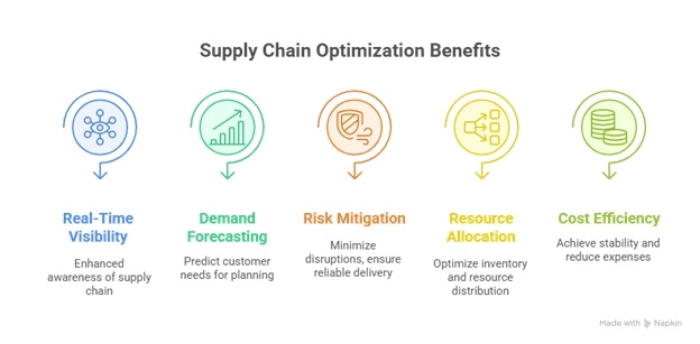Lately, the world is more concerned than ever with COVID-19, the Russia-Ukraine war, and many other global events and incidents. These conflicts have put supply chains under a lot of stress, which is not a good sign for the marketplace. From empty shelves at average inventory stocks to delayed online orders, we’ve all felt the impact of disruptions. But the good news is that Predictive AI in supply chain management is turning things around. The involvement of AI is making solutions smarter and faster and helping businesses stay a step ahead.
But how is AI solving the global supply chain crisis, and why does it matter? Let’s break down all these key points of the role of predictive AI in the supply chain in this comprehensive blog post.
The Role of Predictive AI in Supply Chain Transformation
Traditional supply chain models have struggled because they rely heavily on past data and slow, manual processes. They cannot quickly respond to sudden changes. This is where AI in supply chain management offers a leap forward.
AI in supply chain market is estimated to be $14.49 billion by 2025. It is projected to reach $50.01 billion by 2031, registering a CAGR of 22.9% during the forecast period!
Predictive AI uses advanced data analysis to spot patterns and forecast what lies ahead. Instead of only responding to problems after they happen, companies can prepare in advance. This proactive approach is changing how companies operate and react to uncertainties.
With predictive analytics for the supply chain, organizations gain a deep view of supply and demand trends, current risks, and resource needs. The results are faster responses, informed decisions, and greater flexibility.
Key Benefits of AI-powered Supply Chain Optimization

- Real-Time Visibility and Insights: Predictive AI in the supply chain allows ongoing monitoring of goods, inventory, and supplier activity. Businesses can view the entire flow of products across the globe without relying on outdated reports. Early warning signs become clear, which helps teams solve problems before they impact the end customer.
- Demand Forecasting and Planning: Fluctuating demand has created large gaps in inventory management. Using AI-powered supply chain optimization, businesses can accurately predict which products will be needed, where, and when. This means fewer shortages and overstocks, better storage use, and improved customer satisfaction.
- Risk Mitigation and Delivery Reliability: Disruptions such as factory closures, transport delays, or material shortages are detected faster with predictive analytics for supply chain operations. AI identifies patterns that may signal a risk so companies can reroute shipments or adjust schedules with less guesswork.
- Smarter Inventory and Resource Allocation: More accurate data allows companies to allocate materials and shares where they require the most. It reduces active management costs and ensures uninterrupted flow even in crisis conditions.
- Stability and Cost Efficiency: Customs, inventory, and adjustments at the production level lead to low waste and low costs. With an overload of finals and more accurate plans, companies can reduce environmental footprints and save logistics expenses.
Business/Industry Examples of AI in Supply Chain Management
Many sectors have started adopting Predictive AI in the supply chain for immediate results. Retailers use AI tools to balance stock levels across different stores, cutting waste and boosting availability. Manufacturers apply predictive analysis to manage supply risks, adjust the production program in real-time, and run assembly lines.
AI is included in supply chain management to adapt the delivery routes in shipping and logistics firms and avoid known disruptions to ensure that orders may come on time. All these actions lead to more stable supply chains, greater efficiency, and improved customer experiences.
How to Start with AI in Supply Chain Management
Adopting Predictive AI does not require large investments or deep technical skills. Many companies choose AI development services to quickly assess their current processes and get custom-built solutions that fit their needs.
Companies seeking faster results can integrate ready-made AI platforms/tools to handle forecasting, demand planning, and route optimization. They can hire AI developers and teams that provide special support and ensure that their solution scales with business growth and changing needs.
How Can You Accelerate AI-Powered Supply Chain Optimization?
Step 1: Assess Current Systems
Examine how data flows within the company and where bottlenecks occur. Identify which problems are most urgent for your supply chain.
Step 2: Build Reliable Data Foundations
Good predictions require accurate, up-to-date information. Start by ensuring data from all departments is collected regularly and securely.
Step 3: Select the Right Predictive AI Tools
Work with trusted AI development service providers to implement tools suitable for your scale and sector. Whether it is inventory, logistics, or supplier management, focused solutions deliver the best ROI.
Step 4: Regularly Monitor and Improve
Predictive AI becomes smarter over time with new data. Continue reviewing system results, update as business needs change, and scale successful solutions to more areas.
A Smarter and More Connected Future for Supply Chains
Global events will keep testing supply chains in the near future. The difference now is that companies have access to powerful tools that deliver foresight and flexibility. With Predictive AI in the supply chain, organizations move from reacting and repairing to predicting and preparing.
Companies that have adopted AI-powered supply chain optimization are already seeing more reliable deliveries, cost savings, and customer satisfaction. Working with experienced teams, whether by hiring in-house AI experts or outsourcing, will help businesses stay competitive and resilient in any environment.
Summary
The road ahead for supply chain management is proactive, visible, and intelligent. Predictive AI empowers organizations to overcome uncertainty with data-driven planning and agile responses. By simplifying complex processes, reducing risks, and strengthening reliability, these advances make a real difference in business performance and for end customers everywhere.
Learn how you can enhance your company’s supply chain outcomes by explaining your current infrastructure to a trusted AI development service provider. Begin building a future-ready operation with their experts today!



